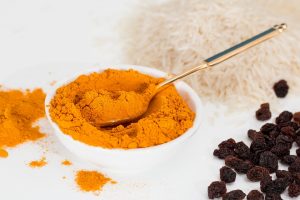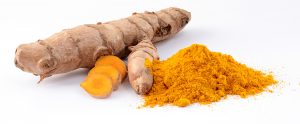Turmeric with its healthy levels of curcumin is great for overall health and wellness. Research has shown that it can improve heart health, digestion, and brain function, and is a powerful antioxidant. Before you add it to your daily diet, you may want to explore any turmeric side effects you should know about.
An Overdose of the Spice Can be Harmful
Adding half a teaspoon to your dishes, curries, and other food may not cause you harm. But, turmeric side effects become evident when you consume the spice in large amounts. Like, for example, when you take it in capsule form regularly. Results of studies conducted on the optimum amounts of the spice are conflicting. HealthLine reports that the safe amount is 3 mg per kilogram or about 1.4 mg per pound of your body weight. Accordingly, a man weighing about 81 kgs can have up to 239 mg per day.
You May Want to Check for the Purity of the Product
While the spice in its pure form cannot harm you, many store-bought packages of the product may contain additives that can cause turmeric side effects. For this reason, choose a reputable brand and check the label carefully for any additional substances. For instance, flours like rye, wheat, or barley. If you’re allergic to foods with gluten or have celiac disease, consuming turmeric laced with these flours can be harmful. Also, check for ingredients like artificial food coloring that may be added to enhance the color.
Turmeric Side Effects on Your Health

Turmeric Lowers Glucose Levels
The curcumin content in turmeric is beneficial in helping people with diabetes control their glucose levels. But, high amounts can cause sudden dips in sugar levels which is also a dangerous condition. For this reason, diabetics may want to be wary of the doses they consume.
Turmeric Raises Estrogen Levels
If you have waning levels of estrogen, like, during menopause, consuming turmeric and the curcumin it contains can help. That’s because curcumin promotes the release of estrogen. However, if you are at risk from cancers caused by high estrogen levels, you may want to avoid taking turmeric. These cancers can include ovarian cancer, breast cancer, and uterine cancer. You may also want to avoid turmeric in conditions like uterine fibroids and endometriosis. Pregnant women are advised to avoid taking too much of turmeric because it can stimulate the uterus and risk the pregnancy. In men, an excessive intake of turmeric can again raise estrogen levels and cause infertility. That’s because curcumin can lower testosterone levels and sperm motility.
Turmeric Prevents Blood Clotting
The curcumin in turmeric acts as a blood thinner and prevents the formation of clots. While this factor is helpful in maintaining heart health, it can also be risky for people with bleeding disorders. Patients with such disorders may want to avoid medicinal doses of turmeric or risk bruising. Further, if you’re scheduled for any kind of invasive surgery, you may want to stop taking high doses of turmeric about 2 weeks before the procedure.
Turmeric Causes Gallstones and Kidney Stones
Turmeric contains 2% oxalate and can thus, cause the formation of stones in the gallbladder or kidney. In case you have bile duct obstruction, you may want to avoid turmeric or risk the worsening of the condition.
Turmeric Interferes with the Absorption of Iron
If you’re anemic, consider cutting back on your intake of turmeric since it can prevent your blood from absorbing the iron in the supplements you’re taking.
Turmeric and the curcumin it contains is known for its beneficial effects. however, it is advisable that you consume it in small quantities by adding it to your food. Excessive doses can cause turmeric side effects that you should avoid.

